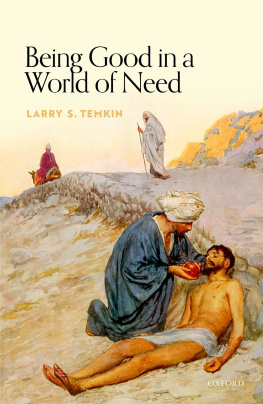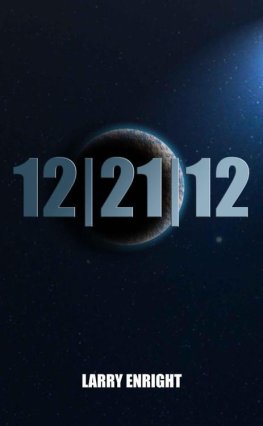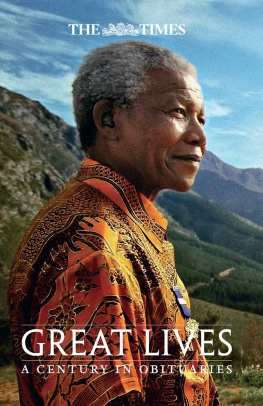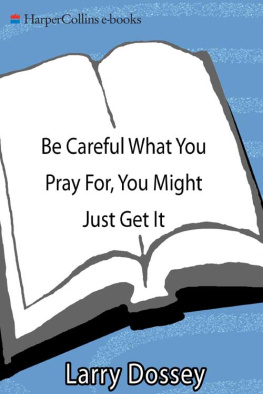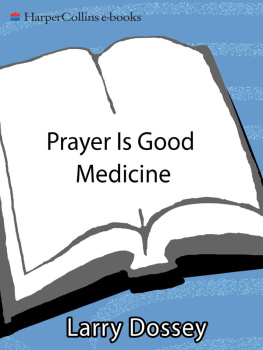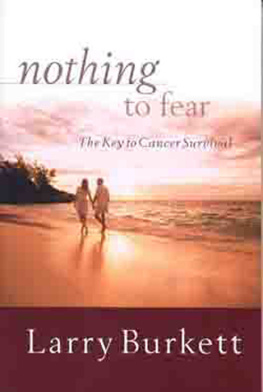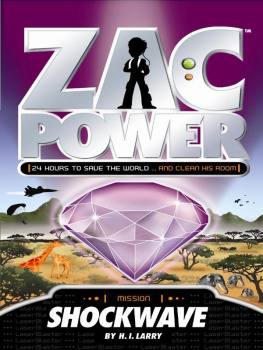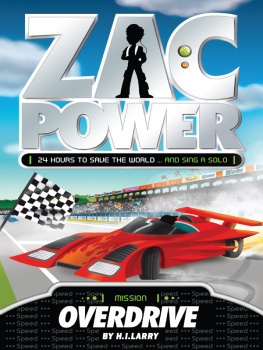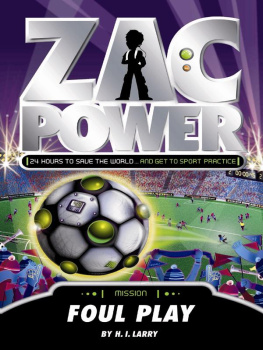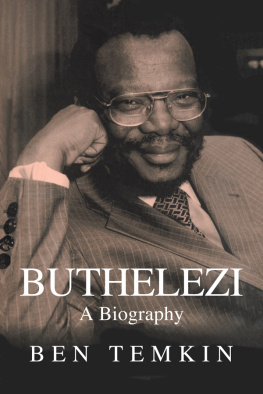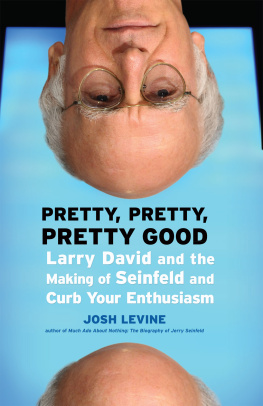Larry S. Temkin - Being Good in a World of Need
Here you can read online Larry S. Temkin - Being Good in a World of Need full text of the book (entire story) in english for free. Download pdf and epub, get meaning, cover and reviews about this ebook. year: 2021, publisher: OxfordUP, genre: Politics. Description of the work, (preface) as well as reviews are available. Best literature library LitArk.com created for fans of good reading and offers a wide selection of genres:
Romance novel
Science fiction
Adventure
Detective
Science
History
Home and family
Prose
Art
Politics
Computer
Non-fiction
Religion
Business
Children
Humor
Choose a favorite category and find really read worthwhile books. Enjoy immersion in the world of imagination, feel the emotions of the characters or learn something new for yourself, make an fascinating discovery.
- Book:Being Good in a World of Need
- Author:
- Publisher:OxfordUP
- Genre:
- Year:2021
- Rating:4 / 5
- Favourites:Add to favourites
- Your mark:
- 80
- 1
- 2
- 3
- 4
- 5
Being Good in a World of Need: summary, description and annotation
We offer to read an annotation, description, summary or preface (depends on what the author of the book "Being Good in a World of Need" wrote himself). If you haven't found the necessary information about the book — write in the comments, we will try to find it.
Being Good in a World of Need — read online for free the complete book (whole text) full work
Below is the text of the book, divided by pages. System saving the place of the last page read, allows you to conveniently read the book "Being Good in a World of Need" online for free, without having to search again every time where you left off. Put a bookmark, and you can go to the page where you finished reading at any time.
Font size:
Interval:
Bookmark:

General Editor
Julian Savulescu, University of Oxford
Choosing Children
The Ethical Dilemmas of Genetic Intervention
Jonathan Glover
Messy Morality
The Challenge of Politics
C. A. J. Coady
Killing in War
Jeff McMahan
Beyond Humanity?
The Ethics of Biomedical Enhancement
Allen Buchanan
Ethics for Enemies
Terror, Torture, and War
F. M. Kamm
Unfit for the Future
The Need for Moral Enhancement
Ingmar Persson and Julian Savulescu
The Robust Demands of the Good
Ethics with Attachment, Virtue, and Respect
Philip Pettit
Why Does Inequality Matter?
T. M. Scanlon
Why Worry About Future Generations?
Samuel Scheffler
Fellow Creatures
Our Obligations to the Other Animals
Christine M. Korsgaard
How to Count Animals, More or Less
Shelly Kagan
Being Good in a World of Need
Larry S. Temkin

Great Clarendon Street, Oxford, OX2 6DP, United Kingdom
Oxford University Press is a department of the University of Oxford. It furthers the Universitys objective of excellence in research, scholarship, and education by publishing worldwide. Oxford is a registered trade mark of Oxford University Press in the UK and in certain other countries
Larry S. Temkin 2022
The moral rights of the author have been asserted
First Edition published in 2022
Impression: 1
All rights reserved. No part of this publication may be reproduced, stored in a retrieval system, or transmitted, in any form or by any means, without the prior permission in writing of Oxford University Press, or as expressly permitted by law, by licence or under terms agreed with the appropriate reprographics rights organization. Enquiries concerning reproduction outside the scope of the above should be sent to the Rights Department, Oxford University Press, at the address above
You must not circulate this work in any other form and you must impose this same condition on any acquirer
Published in the United States of America by Oxford University Press
198 Madison Avenue, New York, NY 10016, United States of America
British Library Cataloguing in Publication Data
Data available
Library of Congress Control Number: 2021942495
ISBN 9780192849977
ebook ISBN 9780192666994
DOI: 10.1093/oso/9780192849977.001.0001
Printed and bound in Great Britain by
Clays Ltd, Elcograf S.p.A.
Links to third party websites are provided by Oxford in good faith and for information only. Oxford disclaims any responsibility for the materials contained in any third party website referenced in this work.
To all those who have been dealt a cruel hand, whether by man or Fate. Those whose plight is sickening, infuriating, heart-wrenching, and deeply unfair.
Also, to Peter Singer, Angus Deaton, and Derek Parfit.
And, as always, to my family. Especially, Bud, Lee, and Meg.
The Dinner Party. On April 3, 2016, my wife Meg and I hosted a small dinner party at our home. The guests included Holly Smith, a major moral philosopher and former Executive Dean of the Faculty of Arts and Sciences at Rutgers; Jeff McMahan, one of the worlds leading philosophers on the ethics of killing and just war theory; Alvin Goldman, widely regarded as the greatest living philosopher of knowledge; Derek Parfit, regarded by many as the best living moral philosopher; Angus Deaton, winner of the 2015 Nobel Prize in Economics for his work on international development; and Patrick Byrne, the billionaire founder of Overstock.com who has been called the most hated man on Wall Street.
Inviting Byrne had been something of a mistake. Knowing that his father was a distinguished Rutgers alum, and having met Byrne on campus on several occasions, I stupidly assumed that he lived in New Jersey. In fact, he lived in Utah. As luck would have it, however, Byrne was scheduled to fly from Utah to London the evening of the dinner party. When he learned who else would be there, he decided to have his plane stop in New Jersey for four hours before continuing on his wayjust long enough for him to attend the dinner.
The event was everything Meg and I had hoped it would be, and then some. The conversation moved easily and quickly across a wide range of fascinating social, political, and ethical topics. It was, if I may say so, the most interesting dinner party I have ever been a part of, whether as host or guest. One particularly memorable moment occurred when Byrne relayed a conversation that he had had with the leader of a tribal faction in Afghanistan some four or five decades earlier. The leadera warlord, in factwas expressing great frustration that the United States and other Western powers were tying his hands, and not allowing him to ruthlessly expunge every man, woman, and child of a rival faction. The leader boldly predicted that one day the West would regret its squeamishness on the matter.
As it turned out, that day arrived on September 11, 2001, when the world became acutely aware of the name of the faction that the warlord had wanted to eradicatethe Taliban. For, as the world soon learned, it was the Taliban which, for many years, had played a central role in supporting and protecting Al Qaeda, the terrorist organization that perpetrated the infamous events of 9/11. You can imagine the conversation that ensued regarding the morality of the warlords position. (A real-world variation of the stock ethical dilemma: if you had the chance to kill Hitler when he was a baby, knowing what he would do as an adult, should you do so? Would you?)
As we neared the end of the meal, the conversation turned to the topic of global poverty and inequality. Deaton, who is a large man with an outsized personality, pushed himself back from the table, and began presenting some of the key claims from his book The Great Escape: Health, Wealth, and the Origins of Inequality. In brief, Deaton suggested that global inequality was to some extent the natural and predictable result of the fact that, due to a wide range of social, political, cultural, and historical factors, human progress takes place at an uneven rate throughout the world. That is, global inequality is the unavoidable flipside of uneven human progress. Accordingly, insofar as human progress is greatly desirable, rightly worthy of celebration, and inevitably uneven, at least practically, there is less cause for handwringing than most people assume regarding global inequality.
Predictably, Deatons view produced an outpouring of responses. On the other side of the table, as well as the issue, Parfit and McMahan spearheaded significant pushback. Longtime supporters of Oxfam, and more recently the Effective Altruism Movement, Parfit and McMahan insisted that even if inequality was the natural byproduct of uneven global progress, there was no reason for it to persist to the massive degree that it does. More particularly, Parfit and McMahan contended that there was much that those who were well off could, and should, do to improve the lot of the worlds worst off. In support of their view, Parfit presented a version of Peter Singers famous Pond Example, which was intended to establish that just as we have a moral obligation to save a child drowning in a pond, even if doing so will ruin our clothes and our expensive shoes, so we have a moral obligation to help those in need on the other side of the world who will die if we dont send them aid, and this is so even if the cost to us of sending aid is the equivalent of the price of a new outfit and a pair of shoes, or more.
Font size:
Interval:
Bookmark:
Similar books «Being Good in a World of Need»
Look at similar books to Being Good in a World of Need. We have selected literature similar in name and meaning in the hope of providing readers with more options to find new, interesting, not yet read works.
Discussion, reviews of the book Being Good in a World of Need and just readers' own opinions. Leave your comments, write what you think about the work, its meaning or the main characters. Specify what exactly you liked and what you didn't like, and why you think so.

